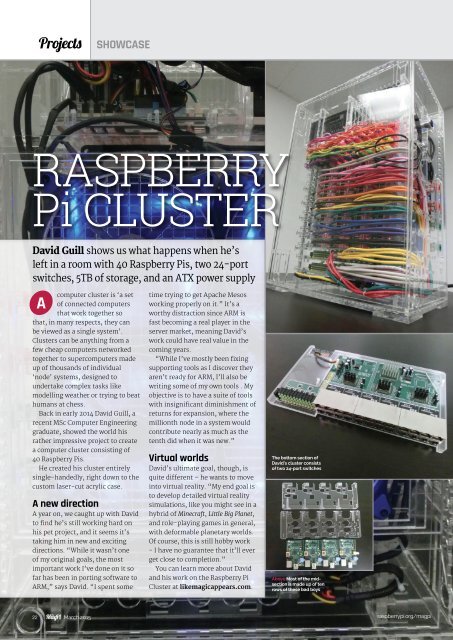Create successful ePaper yourself
Turn your PDF publications into a flip-book with our unique Google optimized e-Paper software.
Projects<br />
SHOWCASE<br />
RASPBERRY<br />
Pi CLUSTER<br />
David Guill shows us what happens when he’s<br />
left in a room with 40 Raspberry Pis, two 24-port<br />
switches, 5TB of storage, and an ATX power supply<br />
A<br />
computer cluster is ‘a set<br />
of connected computers<br />
that work together so<br />
that, in many respects, they can<br />
be viewed as a <strong>single</strong> system’.<br />
Clusters can be anything from a<br />
few cheap computers networked<br />
together to supercomputers made<br />
up of thousands of individual<br />
‘node’ systems, designed to<br />
undertake complex tasks like<br />
modelling weather or trying to beat<br />
humans at chess.<br />
Back in early 2014 David Guill, a<br />
recent MSc Computer Engineering<br />
graduate, showed the world his<br />
rather impressive project to create<br />
a computer cluster consisting of<br />
40 Raspberry Pis.<br />
He created his cluster entirely<br />
<strong>single</strong>-handedly, right down to the<br />
custom laser-cut acrylic case.<br />
A new direction<br />
A year on, we caught up with David<br />
to find he’s still working hard on<br />
his pet project, and it seems it’s<br />
taking him in new and exciting<br />
directions. “While it wasn’t one<br />
of my original goals, the most<br />
important work I’ve done on it so<br />
far has been in porting software to<br />
ARM,” says David. “I spent some<br />
time trying to get Apache Mesos<br />
working properly on it.” It’s a<br />
worthy distraction since ARM is<br />
fast becoming a real player in the<br />
server market, meaning David’s<br />
work could have real value in the<br />
coming years.<br />
“While I’ve mostly been fixing<br />
supporting tools as I discover they<br />
aren’t ready for ARM, I’ll also be<br />
writing some of my own tools . My<br />
objective is to have a suite of tools<br />
with insignificant diminishment of<br />
returns for expansion, where the<br />
millionth node in a system would<br />
contribute nearly as much as the<br />
tenth did when it was new.”<br />
Virtual worlds<br />
David’s ultimate goal, though, is<br />
quite different – he wants to move<br />
into virtual reality. “My end goal is<br />
to develop detailed virtual reality<br />
simulations, like you might see in a<br />
hybrid of Minecraft, Little Big Planet,<br />
and role-playing games in general,<br />
with deformable planetary worlds.<br />
Of course, this is still hobby work<br />
- I have no guarantee that it’ll ever<br />
get close to completion.”<br />
You can learn more about David<br />
and his work on the Raspberry Pi<br />
Cluster at likemagicappears.com.<br />
The bottom section of<br />
David’s cluster consists<br />
of two 24-port switches<br />
Above Most of the midsection<br />
is made up of ten<br />
rows of these bad boys<br />
22 March 2015<br />
raspberrypi.org/magpi


